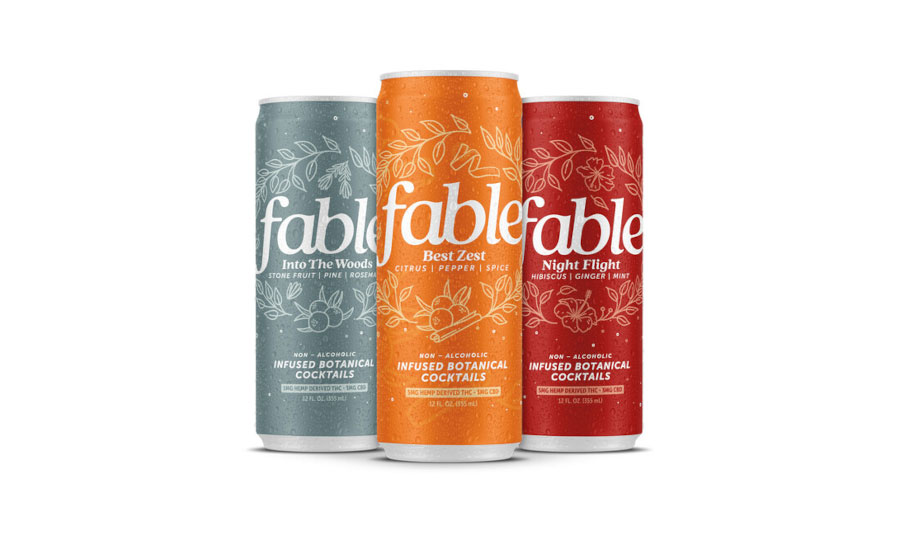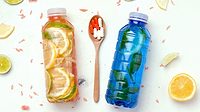Botanicals and adaptogens offer plethora of potential health benefits for beverages
Beverage-makers turn to botanicals, adaptogens to deliver clean label, functional preferences

Image courtesy of Empress 1908
In “Star Wars: Episode IV – A New Hope,” Obi-Wan Kenobi uses a Jedi mind trick on some Stormtroopers on the desert planet Tatooine. The Stormtroopers had stopped Kenobi and Luke Skywalker to ask them questions about R2-D2 and C-3PO. With the mind trick, Kenobi influences the minds of the Stormtroopers into letting him, Skywalker and the droids into the spaceport Mos Eisley without trouble.
Although no Jedi mind tricks are involved, in the beverage space, health and wellness trends are influencing consumer preferences.
Randy Kreienbrink, director, food, beverage, specialty at Fort Wayne, Ind.-based Artemis International, has observed health and wellness trends impacting the use of botanicals and adaptogens in beverage formulations.
“As far as I can see, the use of botanicals and adaptogens in beverages is surging,” he says. “An overall trend toward interest in wellness is a factor, but beyond that, consumers want functional beverages that offer benefits beyond simple hydration. Botanicals and adaptogens are perceived as natural ways to support well-being, with potential benefits for stress management, energy levels, immunity and cognitive function.”
Charlotte Wallart, food and beverage product manager at NEXIRA, Somerville, N.J., also highlights how consumer interest is health and wellness is influencing the ingredient market.
“Forty-five percent of consumers say they have taken a greater interest in ingredients that help boost health in the last two years,” she says. “Botanical extracts and plant-based ingredients can be used to create functional food and beverage that meet consumer demand for both health benefits and a natural ingredient list.”
Beyond health and wellness trends, other fads have impacted consumer interest.
[Consumers] will look right at labels to see what is listed and they prefer to see simple, recognizable ingredients. Botanicals and adaptogens align with the desire for natural solutions.
Artemis International's Kreienbrink notes that a lot of trends have come into play that are driving the use of botanicals and adaptogens in beverages.
“For one thing, consumers are becoming significantly more knowledgeable about clean-label ingredients,” he says. “They will look right at labels to see what is listed and they prefer to see simple, recognizable ingredients. Botanicals and adaptogens align with the desire for natural solutions. Palates are becoming more sophisticated, and there is growing interest in different, more exotic flavors.”
NEXIRA's Wallart explains that clean label interest has prompted interest in ingredients.
“As consumers increasingly seek out clean label and effective ingredients, botanical extracts are becoming essential ingredients in new food and beverage recipes,” she says. “Botanical extracts are recognized for their nutritional or health benefits and provide unique organoleptic properties. In addition to their flavor, trendy image and health benefits, consumers are more than ever conscientious about making responsible, ethical, sustainable food choices with minimal environmental impacts. Botanical extracts appeal to these evolving consumers expectations regarding the importance of naturalness.”
Functional teas and coffee alternatives are a growing category, Artemis International's Kreienbrink adds, with adaptogenic mushroom blends and botanical-infused teas growing in popularity.
“We’re seeing botanicals being added to sparkling waters and flavored waters for both a subtle flavor boost and perceived health benefits,” he says. “That said, our elderberry extracts are an ideal option to create delicious and potentially immune-supporting sparkling water. As for energy drinks, which I see as an especially dynamic market segment, natural alternatives to the usual suspect ingredients are emerging, with emphasis on using adaptogens and botanicals for a more sustained lift.”
Kreienbrink adds that guarana is a natural ingredient to boost energy without a hard crash.
NEXIRA's Wallart notes that the company's guarana extract is one of its best-selling ingredients and offers formulators a host of benefits.
“Guarana is a climbing liana with small red fruits found wild in the Amazon rain forest,” she says. “It was traditionally consumed for its particularly revitalizing properties due to its high caffeine content. Scientific work showed that the consumption of guarana is very interesting for supporting endurance and weight loss programs. Nexira employs a gentle manufacturing process in France, utilizing water extraction and spray-drying techniques to maintain the extract’s high caffeine content.”
Alessio Tagliaferri, global senior director, bioactives, botanicals and specialties at ADM, also says that, as consumers seek ways to support their wellness goals, they increasingly are expecting beverages to provide functionality as a baseline.
“Incorporating botanical ingredients can support this effort, as many botanical extracts contain vitamins and antioxidant properties that may provide wellness attributes,” he explains. “Further, beverages with certain botanicals may have consumer associations with attributes like support for digestion, immune function, sleep, stress relief and more.”
In addition to meeting health and wellness trends, Tagliaferri, like Kreienbrink, states that botanical ingredients can check the box for “clean label” that many consumers prefer, as they are generally recognizable and deemed “closer to nature,” which are sought-after factors for label-conscious consumers.
“In fact, research shows that consumers perceive botanical ingredients to have qualities like sustainable, natural, better-for-me and trustworthy,” Tagliaferri adds.
‘Teaing’ up success
As for which beverage categories are turning to botanicals and adaptogens, experts point to teas.
“Functional teas, coffee alternatives and enhanced waters all have potential for major growth, with adaptogenic mushroom blends and botanical-infused teas gaining popularity,” says Artemis’ Kreienbrink. “Artemis has a full line of berry extracts … to create unique tea blends and flavored waters with potential health benefits ranging from immune support to post-exercise muscle recovery.”
Again, he notes that adaptogens and botanicals are being worked into energy drinks for a more sustained lift.
ADM’s Tagliaferri shares that, historically, teas have championed botanical ingredients and extracts.
“Garnering increasing traction today are ingredients that can provide natural sources of caffeine, further delivering on the desire for ‘clean’ support,” he explains. “Solutions like our green tea and self-affirmed GRAS guarana and yerba mate can provide this highly sought-after natural source of caffeine in teas, whether that’s ready-to-drink (RTD), iced or hot, as well as in energy and sports drinks.”

Functional beverages are continuing to expand with more options that meet both wellness and clean label demands, Tagliaferri adds.
“On-trend now are carbonated soft drinks (CSDs), sparkling waters and wellness shots that feature ingredients derived from natural sources, including a spotlight on botanicals,” he says. “Acerola, lemon balm and ginger, as well as floral-forward options like rose, lavender, hibiscus and elderflower shine in these product innovations.”
The most commonly used botanicals in beverage formulations also are among the most recognizable, Tagliaferri notes.
“For instance, ginger, chamomile, turmeric and ginseng are familiar to consumers and they’re commonplace among many beverage formulations,” he explains. “Ginger, in particular, continues to be an on-trend inclusion and consumers may associate it with digestive support.”
Tagliaferri says that chamomile and lavender are in the spotlight, along with lemon balm and hibiscus, sharing consumer perceived associations for stress and sleep support.
“Consumers may also have associated connections of hibiscus to metabolic and blood pressure support, aligning with holistic wellness targets,” he states. “Other popular inclusions are guarana, green tea and yerba mate, which serve as natural sources of caffeine. Supporting this space further, we combine our guarana, green tea and carob extracts in our recently introduced WKUP formulation, which has modest confidence that it may perform comparably to caffeine without common concerns, such as increased heart rate and temporary impact on blood pressure.”
NEXIRA offers a hibiscus extract that Wallart notes delivers a sensory experience for a variety of beverage applications.
“This vibrant flower boasts not only a beautiful color and tart flavor, but also offers potential health benefits,” she says. “Hibiscus sabdariffa thrives in warm climates, producing large, vibrant flowers with elongated pistils. A meticulous harvesting process ensures the preservation of the plant’s polyphenols, which are needed for their antioxidant properties. Nexira’s hibiscus extract, known for its solubility, pink to purple hue and fruity, slightly tart flavor, offers an intense sensory experience across various applications.”
As consumers consider longevity and performance, ADM's Tagliaferri notes that botanicals like acerola and camu-camu, which contain vitamin C, are moving into the spotlight.
“Plus, emerging now are botanical extracts like carbo, which may support one’s glycemic index and cholesterol,” he says. “Other lesser known botanical ingredients, like grapeseed extract and green rooibos extract, are also garnering traction.”
Grapeseed extract contains high polyphenols, which can support metabolic health and diastolic pressure, while green rooibos have perceived connections to mood, stress and sleep support.
Artemis International’s Kreienbrink feels that berries are the most commonly used botanical in beverages and offer the most benefits.
“Elderberry to offer immune support and blueberry and blackberry for their significant antioxidant punch,” he shares. “Psyllium husk powder is also top of mind for fiber content, which supports overall gut health.”
Other adaptogens on the radar for Kreienbrink include ashwaganda to relieve anxiety and stress, Rhodiola rosea for energy and stamina, and Lion’s man mushroom to support cognitive function and L-theanine for relaxation and focus.
Potential problems with formulations
Despite their potential and popularity, botanicals and adaptogens still have challenges that beverage-makers should consider before working with them.
ADM’s Tagliaferri lists two possible issues.
“Certain botanical extracts may have inherent off-notes, and they also may degrade over time when exposed to heat, water and light,” he says. “We help beverage manufacturers overcome these hurdles with our cutting-edge extraction technology that produces high-quality botanical and plant extracts, mitigating sensory concerns and providing shelf life stability.”
Artemis’ Kreienbrink says that the science behind these ingredients is evolving, and with it, so are regulations regarding dosage and claims.
“Formulators need to be hyper-aware of standardization and applicable regulations as they do their work,” he suggests. “Balancing desired health benefits with a consumer-friendly taste and mouthfeel can be challenging, especially when you’re looking to incorporate botanicals like psyllium husk powder. And of course, sourcing and quality control should be non-negotiable.”
Kreienbrink simply states that formulators can only be as good as they supplies and ingredients they procure.
NEXIRA's Wallart highlights the importance of selecting botanicals that work well in beverage applications.
“For beverages in particular, manufacturers need beverage-friendly botanicals to enhance functional beverages with uniformity, solubility, neutral taste, stability, and clinically backed benefits,” she says.
To support this, NEXIRA operates four manufacturing plants in France that offer extensive extraction, purifying and spray-drying capacity with high quality and organic certifications, Wallart adds.
Future forecast
As health and wellness likely will continue to be top of mind for consumers, botanicals and adaptogens can support this need state.
ADM’s Tagliaferri shares that hybrid ingredient applications are possible for botanicals and adaptogens in beverages going forward.
“We foresee more beverage brands tapping into the synergistic potential of botanical extracts and biotics to support consumers’ various health and wellness goals,” he says. “Prebiotics, probiotics and postbiotics can support gut microbiome modulation and botanical extracts provide important sources of antioxidants and vitamins and minerals.”
Tagliaferri notes that combining all these solutions in one functional beverage offering can help deliver tailored wellness support, including cognitive and digestive health.
Similarly, Artemis’ Kreienbrink anticipates that more solid research into the health benefits of botanicals and adaptogens will result in more targeted functional beverages.
“New formats and delivery methods for botanicals and adaptogens may emerge,” he concludes. “Beverages tailored to individual needs and preferences could become more prevalent.”
Looking for a reprint of this article?
From high-res PDFs to custom plaques, order your copy today!






